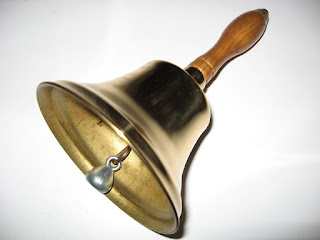e.g. “‘Rain in August meant we were saved by the bell and I expect an average German crop,’ he said, adding that along with [the] U.S. crop there would be ‘sufficient market supply’ although prices would remain high.”
There are several theories regarding the origin of this phrase.
In a boxing match, the ringing of a bell to mark the end of a round can save a floored contestant [1,2]. This appears to be the most popular explanation, and the phrase is still frequently used in reports on boxing matches.
e.g. “He beat the count only for Lomachenko to resume the assault and was soon floored a second time, making it to his feet at nine before he was saved by the bell.”
Another claim is that the phrase originates from a Horse Guard Parade in London during the Victorian era, when a guard was accused of being asleep on duty. He denied this charge and stated that he had heard Big Ben's main bell chime 13 times at midnight, rather than the expected 12. When the clock mechanism was checked, it was found that a cog was out of line, which would indeed cause Big Ben to chime 13 times rather than 12. Based on this evidence, the guard was freed and thus saved by the bell [3].
A third theory relates to ‘safety coffins’. These were invented in response to stories of people being buried alive after being mistakenly declared dead, which understandably led to people fearing that this might happen to them. (This fear was named taphophobia.) Many safety coffins were fitted with a bell to allow the occupant to call for help [4], and it is suggested that these were the origin of the phrase “saved by the bell” [5]. However, it appears doubtful whether anyone was ever buried in a safety coffin, despite several designs being built and sold [6], and Wilton (2009) describes this explanation as a myth [7].
[1] “saved by the bell.” In The Oxford Dictionary of Phrase and Fable, edited by Knowles, Elizabeth, Oxford University Press, 2005.
[2] “saved by the bell.” In Brewer's Dictionary of Modern Phrase and Fable, edited by Room, Adrian and Brewer, Ebenezer Cobham. 2nd ed. Cassell, 2009.
[3] Jack, Albert. Red Herrings & White Elephants: The Origins of the Phrases We Use Everyday (pp. 214–215). Unknown. Kindle Edition.
[4] Cascella, Marco. “Taphophobia and ‘Life Preserving Coffins’ in the Nineteenth Century.” History of Psychiatry 27, no. 3 (September 2016): 345–49.
[5] http://www.ancientpages.com/2016/02/09/strange-history-of-safety-coffins-from-ancient-to-modern-times/
[6] https://australianmuseum.net.au/about/history/exhibitions/death-the-last-taboo/safety-coffins/
[7] Wilton, David. Word Myths: Debunking Linguistic Urban Legends, Oxford University Press, 2009.
Photo credit: Brian Metcalfe

No comments:
Post a Comment